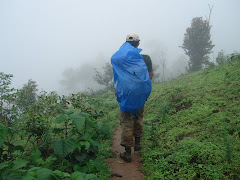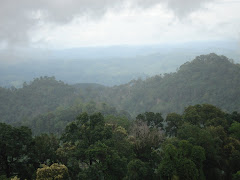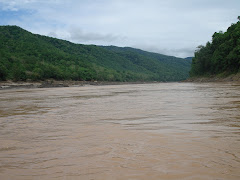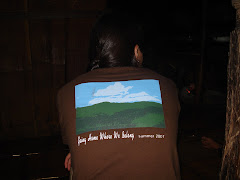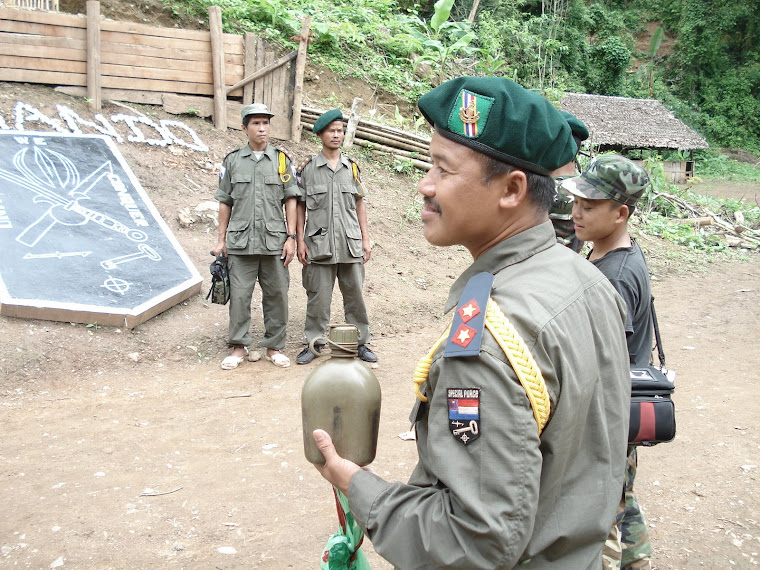August 31, 2008
Dear Friends of Going Home Where We Belong Program:
Warm greetings. I am pleased to inform you that we had just successfully executed our Going Home 2008 program and that we are now back in school again for another academic year.
Before I go on, I need to acknowledge you and apologize to some of you that our plan did not quite go as we anticipated and therefore there were some miscommunications. The reason for that was that all three of us here at Indiana University did not receive our necessary travel documents on time back from the Homeland Security Department. Therefore although we planned to begin our trip by May 7, we could not actually leave the U.S until July 1. We did apply for our travel document six months ahead and that’s why we did not anticipate that it would have caused us such trouble.
Nevertheless, we are pleased to inform you that the much delayed program went very well although it was severely cut short. There were some minor changes in all the activities, but generally we were able to do most of the things we planned to do with the unwavering cooperation from our colleagues back home. We spent a week with the KSU and other organizations in the Karenni Camp 1 for a workshop on Understanding Local Government, which was originally planned to be a joint program with KSNG. After that, we spent another brief period in Mutraw District (5th Brigade) with our officers from the four northern brigades (1st, 2nd, 3rd, and 5th). Together with our officers, we had a 2-day session of critical discussion on Civilian and Military Administrations with a focused look into the importance of accountability and transparency. Following our time in 5th Brigade, we continued the last part of our Going Home program in the Mergui/Tavoy District (4th Brigade) and spent one full week there for a course on Understanding Local Government: Public Policy Making and Analyzing and Critical Thinking. It was a refresher course for the district leadership and we had the most incredibly enriching time learning and sharing with our leaders.
In the following segments, we would like to update you with the situation back home, about the people, and hope for the future of our peoples and our country.
We would like to thank each and every one of you for your generous contribution to this Going Home Where We Belong and we very much hope that many of you will be able to join us in person in the near future. No matter how far and for how long we have been apart from the beloved land, it remains true that the land is a home we belong to just as much as it belongs to us. Please join us whenever you can and reclaim it.
Sincerely Yours,
Going Home Coordinating Team
Sunday, August 31, 2008
Going Home 2008 - Karenni First
The following is a memo on our Going Home Where We Belong – Summer 2008 trip which we started on July 2 and ended on August 20, 2008.
In Karenni Camp 1 (July 7 – 12, 2008)
With the initiative of Karenni Students Union (KSU), Going Home team participated in a workshop entitled Understanding Local Government. The participants were mostly from the Social Development Course, Karenni Leadership and Management Course, and other individuals working with different camp-based organizations.
The intention was to strengthen their understanding of how things are done at local government level, the systems and bureaucracy, and how to make and analyze public policy. The course was more of discussions based on the practical means available in their community. We hoped that discussions on various issues concerning local government or public policy would encourage our participants to take part in public works, or to be interested in public services.
Though we had a great short week with our participants, on the other hand, it was disheartening to see and know that most of our participants, especially young students, were drifting in the dream to go to third-countries. While it is perfectly understandable that every human being searches for green pasture where life offers hope – in their struggle and for their brighter future – and that our peoples are of no exception, just to see them drifting reluctantly simply because the current situation is so bleak even to maintain hope is heartbreaking.
Most of them participated so enthusiastically but the uncertain tomorrows in the refugee camps keep them far from being settled.
We found that it was part of the negative impact created by the resettlement programs currently so popular in the refugee camps along the Thai-Burma border. However, the root-causes of such situation go deeper – the 60 years old unresolved civil war, the continuation of oppression based on ethnicities and religions, and the uncertainties of refugee-camp life.
We would like to thank KSU for organizing the workshop despite the situation that was not so encouraging. Such initiative was a long-shot but necessary one, for we must not give up on believing and hoping that situation must change and we must overcome any and all the difficulties in order for us to rebuild our nation, a nation undergoing desertion on daily basis now because of the unbearable oppressions.
=========
In Karenni Camp 1 (July 7 – 12, 2008)
With the initiative of Karenni Students Union (KSU), Going Home team participated in a workshop entitled Understanding Local Government. The participants were mostly from the Social Development Course, Karenni Leadership and Management Course, and other individuals working with different camp-based organizations.
The intention was to strengthen their understanding of how things are done at local government level, the systems and bureaucracy, and how to make and analyze public policy. The course was more of discussions based on the practical means available in their community. We hoped that discussions on various issues concerning local government or public policy would encourage our participants to take part in public works, or to be interested in public services.
Though we had a great short week with our participants, on the other hand, it was disheartening to see and know that most of our participants, especially young students, were drifting in the dream to go to third-countries. While it is perfectly understandable that every human being searches for green pasture where life offers hope – in their struggle and for their brighter future – and that our peoples are of no exception, just to see them drifting reluctantly simply because the current situation is so bleak even to maintain hope is heartbreaking.
Most of them participated so enthusiastically but the uncertain tomorrows in the refugee camps keep them far from being settled.
We found that it was part of the negative impact created by the resettlement programs currently so popular in the refugee camps along the Thai-Burma border. However, the root-causes of such situation go deeper – the 60 years old unresolved civil war, the continuation of oppression based on ethnicities and religions, and the uncertainties of refugee-camp life.
We would like to thank KSU for organizing the workshop despite the situation that was not so encouraging. Such initiative was a long-shot but necessary one, for we must not give up on believing and hoping that situation must change and we must overcome any and all the difficulties in order for us to rebuild our nation, a nation undergoing desertion on daily basis now because of the unbearable oppressions.
=========
Going Home 2008 - 5th Brigade (Mutraw Dist.)
In 5th Brigade with the Officers from KNLA Northern 4 Brigades
(July 13 – 30, 2008)
5th Brigade is in Mutraw District of Kawthoolei. The place we were in was called Weh Gyi and was located by the River Salween. We traveled by a boat from Mae Sam Lap for four hours to get to Weh Gyi. It was also a place where the infamous Weh Gyi dam is to be built against the will of the local people, endangering the livelihood and the existence of all the people and living things in the area.
Going Home team was invited to lead a refresher course on Civilian and Military Administrations: accountability, transparency, and checks & balances, an initiative of the 5th Brigade as part of its short and long terms planning to restructure the Organization at district and brigade levels. Participants in this course were the officers from the 1st, 2nd, 3rd, and 5th Brigades. The underlying goal of such course was to bring about a more systematic structure within the organization and to ensure checks and balances between orders of authority. With critical look into the current structure and state of the organization, we had so much vibrant and often heated discussions during our 2-day session. We learned that admitting to our own weaknesses and realizing our inabilities are necessary pains to go through if we are to better ourselves and our struggle. Some of the things that we discussed and learned during this 2-day session would be reflected in the outcomes of, at least, Mutraw District Congress which was held in mid-August 2008.
We would like to thank the Brigadier of 5th Brigade and all colleagues from 1st, 2nd, 3rd, and 5th Brigades – KNLA - for this important opportunity to share and learn from each other. Moreover, we would like to thank all of them for their steadfast understanding of our difficulties in trying to come back home. Although there was expectation that Going Home team would be bigger this year than 2007, we were sad to present them with yet again a small group. Though we as coordinators were disappointed, our hosts - our leaders and colleagues – were more understanding of and ever enduring the imperfect efforts we made.
While in the 5th Brigade, we had a chance to observe the commemoration of Karen National Defense Organization Day at the new training site with the Karen soldiers from Commandos School.
It was absolutely encouraging to meet with our officers and soldiers who are working hard, always bettering themselves, and positive-minded. Their energy and unfailing commitment give us hope for a better future even in the midst of all difficulties. But, we all are aware that to gain complete recognition of Karen State, freedom of our peoples, and to realize our rights to peace and prosperity must be a national effort and that it is not merely an effort can be made and achieved by a group of brave men and women. We feel deeply grateful that many of our peoples are making all kinds of enormous sacrifices to carry on the struggle of the Karen people, for a better future of the Karen people and for a peaceful Burma. But, we understand that we all as the people of Burma – Karens and non-Karens alike - have a stake in each other. The wellbeing of the Karens depends on the wellbeing of all others in Burma. We cannot deny that we will rise and fall together as one people, as one nation, in Burma.
Going Home 2008 - In the South (Mergui/Tavoy Dist.)
In Mergui/Tavoy District (4th Brigade – KNLA)
The chairman of Mergui/Tavoy district had requested for a course of Understanding of Local Government for the district leadership and we were glad to have made it this time although it was long delayed. During the intensive period of the course, we studied the functions of local government, specifically how public policies are made and analyzed. There were lots of comparative analyses over the situation on the ground, the ever-changing circumstances, and the practices. The participants included the entire district administration including the chairman and the brigadier of 4th Brigade. Mergui/Tavoy District is one of the most vibrant districts in the KNU and we were greatly encouraged by their enthusiasms and active involvement in the discussions.
The chairman of Mergui/Tavoy district had requested for a course of Understanding of Local Government for the district leadership and we were glad to have made it this time although it was long delayed. During the intensive period of the course, we studied the functions of local government, specifically how public policies are made and analyzed. There were lots of comparative analyses over the situation on the ground, the ever-changing circumstances, and the practices. The participants included the entire district administration including the chairman and the brigadier of 4th Brigade. Mergui/Tavoy District is one of the most vibrant districts in the KNU and we were greatly encouraged by their enthusiasms and active involvement in the discussions.
Going Home 2008 - Reflections
Conclusion
We had a chance to observe the 58th Anniversary of Karen Martyrs’ Day fell on August 12, following the 8.8.88 anniversary of students uprising in the cities of Burma. All the Burmese services by VOA, BBC, RFA, and DVB aired programs analyzing the current political situation in Burma and the movement for restoration of democracy in commemoration of the 8.8.88 anniversary.
As we listened, we were disheartened by the fact that Burmese language media – excluding the government controlled media inside Burma – was despicably subjective in their presentations of the problems in Burma. Although the purported analytical presentations were coincided with the commemoration of the 8.8.88 anniversary, it was about a country in which various ethnic groups, including the ethnic Burmans/Burmese are residing. The presentations, and almost all the analyses and views, centered on the urban-based movement led by students, monks, and the NLD in particular, disregarded the collective efforts made by various ethnic minorities groups. The plights of ethnic minorities and their efforts to bring about change in the country were treated as side-dish. The Burma question was separated from the question of ethnic minorities as if they were from another planet.
What appears to us, and what we learned through out our time with folks on the ground, is that there is little prospect, if there is any, for our beloved country so long as the Burma problem is seen and understood in the terms of “theirs” and “ours.” The general notion presented by the Burmese language media portrays the struggle of ethnic minorities as a separate struggle from the struggle for change in Burma, the pro-democracy movement, per se, as a whole.
We think that it seems more imperative now than ever for the Burmese people in general to know the histories of their own country and their own fellow country-people. In the eve of our nation’s independence in 1948 when the entire Karen peoples went out on the streets of Burma to protest, their unequivocal demand was and still remains the respect for and recognition of democratic values which includes equality and right to self-determination. Since 1948, the Karen peoples had rejected any idea that might lead to civil war.
Given the dire situation in which our country is dying a slow death, we think no time is more right than now that the people of Burma come to term with the reality – that is –Burma is a one community of which the membership belongs to all the ethnic peoples. And, we must understand that membership of such community means we see the stake that each of us has in our neighbor’s dreams and struggles as much as we see in our own. In same regard, we believe that the persistent resistance - politically, culturally and militarily - of the multiple ethnic nationalities for equality and their right to self-determination should be factored in as a part of - not as a separate - the broader political struggle for democratic change in Burma.
To be sure, we are challenged to understand that the wellbeing of the Karens depends on the wellbeing of all others in Burma and vice versa. The stake is too high to pretend that one will rise when others fall in Burma. Even SPDC understands that it cannot rise alone while others are falling and such understanding can be seen in efforts to recruit and organize groups such as USDA.
It is clearer to us now that for the KNU, the question is not whether or not it can fight off the military regime. Rather, the question is what is then next after the military regime. However, everyone else in Burma will have to answer this collectively with the Karens.
===
We had a chance to observe the 58th Anniversary of Karen Martyrs’ Day fell on August 12, following the 8.8.88 anniversary of students uprising in the cities of Burma. All the Burmese services by VOA, BBC, RFA, and DVB aired programs analyzing the current political situation in Burma and the movement for restoration of democracy in commemoration of the 8.8.88 anniversary.
As we listened, we were disheartened by the fact that Burmese language media – excluding the government controlled media inside Burma – was despicably subjective in their presentations of the problems in Burma. Although the purported analytical presentations were coincided with the commemoration of the 8.8.88 anniversary, it was about a country in which various ethnic groups, including the ethnic Burmans/Burmese are residing. The presentations, and almost all the analyses and views, centered on the urban-based movement led by students, monks, and the NLD in particular, disregarded the collective efforts made by various ethnic minorities groups. The plights of ethnic minorities and their efforts to bring about change in the country were treated as side-dish. The Burma question was separated from the question of ethnic minorities as if they were from another planet.
What appears to us, and what we learned through out our time with folks on the ground, is that there is little prospect, if there is any, for our beloved country so long as the Burma problem is seen and understood in the terms of “theirs” and “ours.” The general notion presented by the Burmese language media portrays the struggle of ethnic minorities as a separate struggle from the struggle for change in Burma, the pro-democracy movement, per se, as a whole.
We think that it seems more imperative now than ever for the Burmese people in general to know the histories of their own country and their own fellow country-people. In the eve of our nation’s independence in 1948 when the entire Karen peoples went out on the streets of Burma to protest, their unequivocal demand was and still remains the respect for and recognition of democratic values which includes equality and right to self-determination. Since 1948, the Karen peoples had rejected any idea that might lead to civil war.
Given the dire situation in which our country is dying a slow death, we think no time is more right than now that the people of Burma come to term with the reality – that is –Burma is a one community of which the membership belongs to all the ethnic peoples. And, we must understand that membership of such community means we see the stake that each of us has in our neighbor’s dreams and struggles as much as we see in our own. In same regard, we believe that the persistent resistance - politically, culturally and militarily - of the multiple ethnic nationalities for equality and their right to self-determination should be factored in as a part of - not as a separate - the broader political struggle for democratic change in Burma.
To be sure, we are challenged to understand that the wellbeing of the Karens depends on the wellbeing of all others in Burma and vice versa. The stake is too high to pretend that one will rise when others fall in Burma. Even SPDC understands that it cannot rise alone while others are falling and such understanding can be seen in efforts to recruit and organize groups such as USDA.
It is clearer to us now that for the KNU, the question is not whether or not it can fight off the military regime. Rather, the question is what is then next after the military regime. However, everyone else in Burma will have to answer this collectively with the Karens.
===
Subscribe to:
Comments (Atom)







